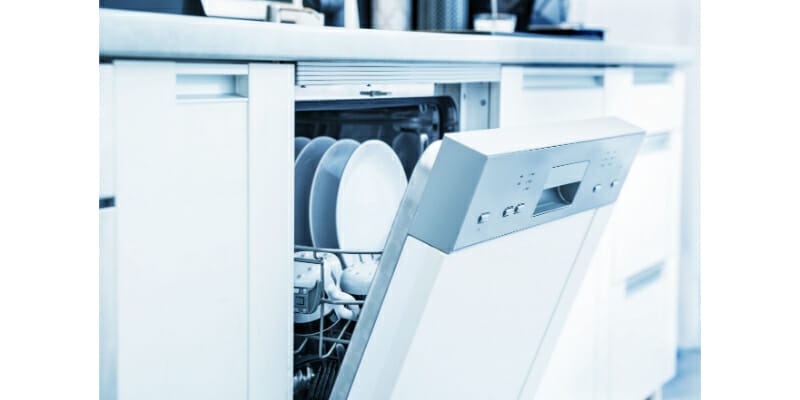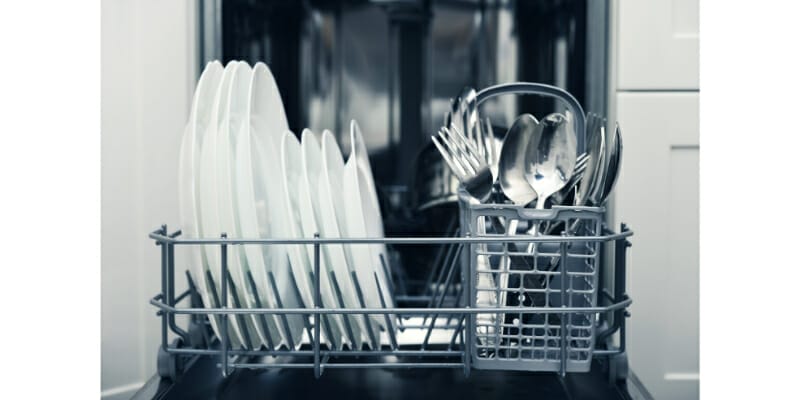Disclaimer: This post may contain affiliate links, meaning we get a small commission if you make a purchase through our links, at no cost to you. For more information, please visit our Disclaimer Page.
Have you ever wondered if a dishwasher heat its own water?
A dishwasher will heat its water. After performing your role of supplying dirty dishes, detergents, and switching on the machine, the first thing a dishwasher will do is to add water. After that, it proceeds to heat the water to the appropriate temperature using its heating elements.

Table of Contents
Will a dishwasher work without hot water?
When it comes to washing the dishes at home, there are two different options to get the job done; they are dishwashing by hand and using a dishwasher. Dishwashing by hand requires you to perform several different processes, such as scraping off food, fetching clean, hot, and soapy water, washing, rinsing and drying (air drying or towel drying) the dishes.
The second option, which requires using a dishwasher, is an approach that involves using a machine to do the hard work. It requires you to load the dishes inside the racks of the machine. Besides, you’ll also need to add detergent, set correct washing cycles, and switch on the machine.
The first burning question that I’ll be addressing is – can a dishwasher work without hot water? To begin, I’ll answer the question by saying yes; dishwashers can work even if there’s no hot water line connected to them.
Why is hot water important
Before going ahead to discuss in detail how dishwashers can work without the hot water lines connected, here’s a quick question; why is hot water important for dishwashing.
According to Sarah Aguirre, an expert in the cleaning industry, using hot water to wash your dishes comes with tons of benefits for you. First, it helps to eliminate bacteria on dishes effectively.
Besides, hot water for dishwashing will help you lift away grease and grime from your dishes. Furthermore, using hot water for your dishwashing can help you reduce drying time and also sanitize your dishes.
Dishwashers heating elements
Now, let’s go back to why a dishwasher can work without you necessarily having to connect a hot water line to it.
Most dishwashing machines have heating elements installed on them. This is what produces the hot water needed by the machine to perform its work.
Here’s a brief description of how the heating elements look like; they are usually installed around the tub of your dishwasher, which is located beneath the lower dish rack.
Furthermore, dishwashers’ heating elements are usually thin and circular. They sometimes come enclosed in a cover, which you need to unscrew before you can see.
A heating element will most likely come with two metal terminals, located at each end of the dishwasher. That’s not all; the terminals also extend down into the lower cavity of the washing machine.
With these heating elements, the dishwashers can always work without hot water. Here’s how it works:
- It all starts with you arranging the dirty dishes inside the racks of the dishwasher. After that, you’ll supply detergent into the dispenser and also set the proper washing cycle on the machine.
- As soon as you switch on the machine, the dishwasher will start by adding water to fill up the small tub at the bottom. The water will come from the cold water line connected to it. As you can see, it’s not using hot water.
- As earlier mentioned, the heating element is installed around the tub of your dishwasher. Since that’s the case, the coil will be the one to heat the water in the small basin to 130 or 140 degrees Fahrenheit.
- After preparing the hot water, a pump inside the dishwasher will proper it to the water jets – here’s where the hot water is forced out and sprayed on the fully loaded dirty dishes in the rack.
As you can see, you don’t necessarily have to supply your dishwasher with hot water through the connection line. Instead, all you need to do, so far the machine has a heating element, is connect a cold water line to it.
The dishwashing machine will be responsible for preparing the hot water, which is important during the dishwashing process, as you already mentioned before.
Do I need hot water to run my dishwasher?
As previously mentioned, you don’t need hot water to run your dishwasher. However, this is true if you have a dishwashing machine that comes installed with the heating element.
If your dishwasher doesn’t have a heating element, it could mean that the machine is a modern one, which only uses the condensation drying system.
Modern dishwashers with condensation drying systems are engineers because of the efficiency standard laid down by the Department of Energy. Even if you’re using this type of dishwasher, the machine will still use hot water.
They ditched the heating element at the beginning of the washing cycle. Instead, they use a condensation drying system, which utilizes a heated rinse at the end of a washing cycle – here’s where the hot water comes in.
Bottom line: all dishwashers don’t necessarily need you to supply them with hot water before they start performing their jobs.
For machines with heating elements, they prepare their hot water at the beginning of the washing cycle after drawing in water.
For machines with a condensation drying system, they get the dishes coated with hot water at the end of the washing cycle by using a heated rinse.

Where does the dishwasher get hot water?
Here’s another frequently asked question regarding how dishwashers work; where exactly do the machines get hot water? There are two answers to the question.
Hot water from the home water supply
The first one is that the hot water used by the dishwasher could come from the pipe connected to the machine from your home water supply unit. In this case, a hot fill hose is used as the connecting line to pass the hot water to the machine.
A couple of benefits are attached to connecting your dishwasher to a hot water supply unit at your home. One of them is that it can always help you save electricity, however, this depends on how the hot water is generated.
Furthermore, by supplying hot water into the dishwasher, it won’t take a longer time for the machine to start washing the dishes.
However, you need to also understand that this approach isn’t without its issue. One of them is that it could damage the filtration system of the dishwashing machine if the water comes in at 140 degrees Fahrenheit or 60 degrees Celsius, which is the optimum temperature for the machine to operate.
Hot water from inside the dishwasher
The second way, which is the common and recommended option, dishwashers generate hot water is through the filtration system that comes with them.
Here’s how this works; it all starts with the cold water supply unit getting connected to the dishwasher.
The dishwashing washing starts operation by adding water from the home water supply unit to the small tub located at its base.
The tub or basin is then heated to about 130 degrees Fahrenheit by the heating element or filtration system located around it. That’s where the hot water used by some dishwashers comes from.
That’s not all; as previously mentioned, some modern dishwashers only utilize condensation drying systems. At the end of the washing cycle, the system uses heated rinse by coating the dishes with hot water.
